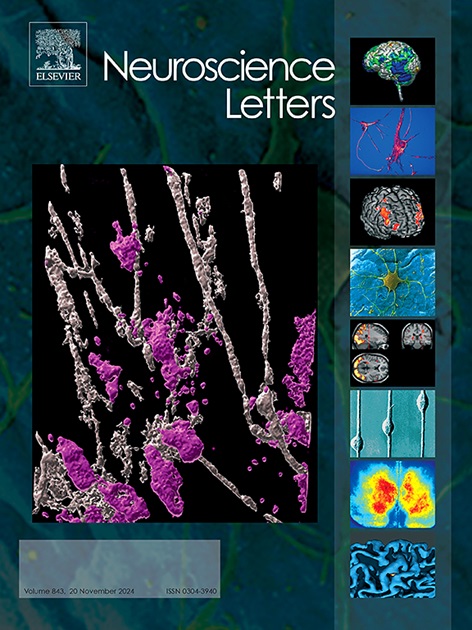鼻内胰岛素给药在早期APP/PS1阿尔茨海默病小鼠中显示有限的tau靶向效应。
IF 2
4区 医学
Q3 NEUROSCIENCES
引用次数: 0
摘要
脑胰岛素信号缺陷有助于阿尔茨海默病(AD)的多种病理特征。鼻内胰岛素已显示出治疗潜力,但其潜在机制尚不清楚。本研究探讨了鼻内胰岛素是否调节早期APPswe/PS1dE9 (APP/PS1)小鼠的tau病理。治疗六周后,未观察到总tau或磷酸化tau水平的显著变化。然而,与tau激酶相关的失调信号通路有改善的趋势。这些发现表明,鼻腔胰岛素对早期AD的保护作用可能不是主要针对tau相关的神经毒性。本文章由计算机程序翻译,如有差异,请以英文原文为准。
Intranasal insulin administration shows limited tau-targeted effects in early-stage APP/PS1 Alzheimer's mice.
Brain insulin signaling deficits contribute to multiple pathologicalfeatures of Alzheimer's disease (AD).Intranasal insulin has demonstrated therapeutic potential, but its underlying mechanisms remain unclear. This study investigated whether intranasal insulinmodulates tau pathology in early-stage APPswe/PS1dE9 (APP/PS1) mice.After six weeks of treatment, no significant changes in total or phosphorylated tau levels were observed. However, there was a trend toward improvement in dysregulated signaling pathways associated with tau kinases. These findings suggest that the protective effect of nasal insulin in early AD may not primarily be against tau-related neurotoxicity.
求助全文
通过发布文献求助,成功后即可免费获取论文全文。
去求助
来源期刊

Neuroscience Letters
医学-神经科学
CiteScore
5.20
自引率
0.00%
发文量
408
审稿时长
50 days
期刊介绍:
Neuroscience Letters is devoted to the rapid publication of short, high-quality papers of interest to the broad community of neuroscientists. Only papers which will make a significant addition to the literature in the field will be published. Papers in all areas of neuroscience - molecular, cellular, developmental, systems, behavioral and cognitive, as well as computational - will be considered for publication. Submission of laboratory investigations that shed light on disease mechanisms is encouraged. Special Issues, edited by Guest Editors to cover new and rapidly-moving areas, will include invited mini-reviews. Occasional mini-reviews in especially timely areas will be considered for publication, without invitation, outside of Special Issues; these un-solicited mini-reviews can be submitted without invitation but must be of very high quality. Clinical studies will also be published if they provide new information about organization or actions of the nervous system, or provide new insights into the neurobiology of disease. NSL does not publish case reports.
 求助内容:
求助内容: 应助结果提醒方式:
应助结果提醒方式:


